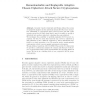135 search results - page 3 / 27 » Adaptive Security of Symbolic Encryption |
CORR
2006
Springer
13 years 7 months ago
2006
Springer
Although good encryption functions are probabilistic, most symbolic models do not capture this aspect explicitly. A typical solution, recently used to prove the soundness of such ...
TCC
2004
Springer
14 years 24 days ago
2004
Springer
Recently Canetti, Krawczyk and Nielsen defined the notion of replayable adaptive chosen ciphertext attack (RCCA) secure encryption. Essentially a cryptosystem that is RCCA secure ...
CRYPTO
2004
Springer
14 years 25 days ago
2004
Springer
We construct two efficient Identity Based Encryption (IBE) systems that are selective identity secure without the random oracle model. Selective identity secure IBE is a slightly w...
ACNS
2006
Springer
13 years 9 months ago
2006
Springer
In this paper, we model the adversary (eavesdropper) present in the wireless communication medium using probabilistic models. We precisely formulate the security-throughput optimiz...
EUROCRYPT
2010
Springer
14 years 7 days ago
2010
Springer
We analyze the relation between induction, co-induction and the presence of encryption cycles in the context of computationally sound symbolic equivalence of cryptographic express...

